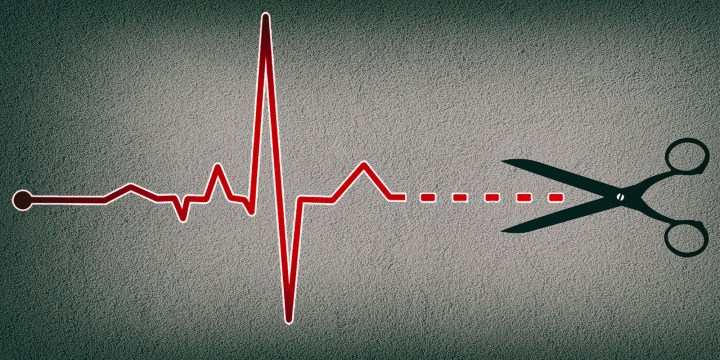Death with dignity
SA cancer survivor fighting for people’s right to die

A law professor survives cancer to begin a personal journey to make the right to die a legal right.
When you cheat death with money, medical science and a miracle you live your life fighting for the right to die with dignity.
This is the irony that Pieter Carstens has embraced. Carstens, a professor of criminal and medical law at the University of Pretoria, beat squamous cancer, but not before it spread from the crown of his head deep towards his brain’s dura. The tumour that he called “the monster that was on my head” left him with a life expectancy of no more than six months about a year after he was first diagnosed in the spring of 2016.
Two years from when he was first diagnosed, 13 specialists and countless visits to a wound clinic later, Carstens was ready to die. The cancer could not be treated with radiation or chemotherapy and an operation ran so high a risk of death or stroke that Carstens rejected this option.
“I knew my number was up. I have always been an avid supporter of PAS [physician-assisted suicide], but I knew I could never get that in South Africa because it’s still considered a criminal offence,” Carstens told a packed auditorium at a Sandton law firm last week.
It’s the law that Carstens seeks to change now. He’s on a mission to fight for what he says is a need to “harmonise the Constitution, common law and medical ethics” and to re-examine the patient-doctor relationship that he says makes a mockery of informed consent and has become a relationship based on contractual obligation rather than healthcare that is caring, compassionate and professional.
“It’s easy to die a violent death in South Africa, but you don’t have the right to die with dignity. I contemplated suicide often but sometimes suicides don’t work and that would be the worst. I was ready to die knowing that I would be incarcerated in my body for months before my death,” he says.
He hit his lowest point in January 2018. He says he was “just broken” knowing he couldn’t easily find a dignified way to die in South Africa and that there was no chance he would be cured.
“The hardest thing was saying goodbye to my dog.”
He started conversations with a PAS clinic abroad with a date set for when his PAS would take place. This process remains one that isn’t straightforward in terms of death certificates and guarantees of protection against prosecution for family or friends who may have accompanied the person to the PAS clinic.
High-profile cases such as that of academic and right-to-die activist Sean Davison highlight the hypocrisy and lack of courage to act by lawmakers and government, Carstens says.
Davison reached an agreement in court in June last year to serve three years’ house arrest instead of facing trial for three murders. He was also sentenced to eight years’ imprisonment suspended for five years.
Carstens considers this kind of deal-making a cop-out and “dishonesty” by the courts: finding someone guilty of assisted suicide but not punishing them.
Around this time though, one of Carsten’s students told him about a new class of immunotherapies that boost the body’s immune system, or T-cells, which are the body’s primary cancer fighters. Drugs like Keytruda, which Carstens was recommended, are checkpoint inhibitors, which remove the signal to T-cell receptors to slow down. The drugs are also able to block cancer cells as they make molecules intended to hijack the messaging to T-cell receptors.
“I could feel the tumour shrinking,” says Carstens, who now can whip off his hat to reveal a smooth, healed skull that he says is nothing short of a miracle.
Carstens’ joy of surviving started with him wanting to share his personal experience and journey in careful detail with his extended medical team. He received an overwhelming non-response, which he deems “a conspiracy of silence” by the medical fraternity.
The experience has also sparked his mission to talk about patients’ rights being trampled on, medical aids that keep charging more but look for loopholes and exclusions not to pay out, and society’s divides – the “flagrant inequality” that he says means he survived because he was rich enough to afford the treatment.
Each Keytruda treatment cost R100,000 and Carstens paid for all four treatments out of his own pocket. Eventually, his medical aid paid two-thirds of the costs. But his mission is centred around reforming the law to allow for a person’s right to die with dignity and to be assisted to make this wish a reality.
Carstens says there are presently three cases before the court seeking declaratory orders to allow ailing people the right to seek help to end their lives. He says the courts have dragged their feet on acting on the 1999 recommendation by the SA Law Commission to move forward on legislation regarding end-of-life decision-making.
“A multilayered approach to the right to die with dignity and to be assisted in this process needs to be acknowledged. This is about informed choice and is about recognising when quality of life has ended.
“There also needs to be a legislative framework that protects such a law from abuse and also protects the diverse religious and socio-cultural views in this country on the right to assisted dying,” he says.
Carstens says things have changed since he “heard the owl call my name, but when you get to rise above death you have to hopefully emerge as an improvement of your former self”.
His new self, he says, doesn’t want to die, but wants to live to fight for solidarity and justice in healthcare, and above all to fight for the legal right to die with dignity. DM

















 Become an Insider
Become an Insider